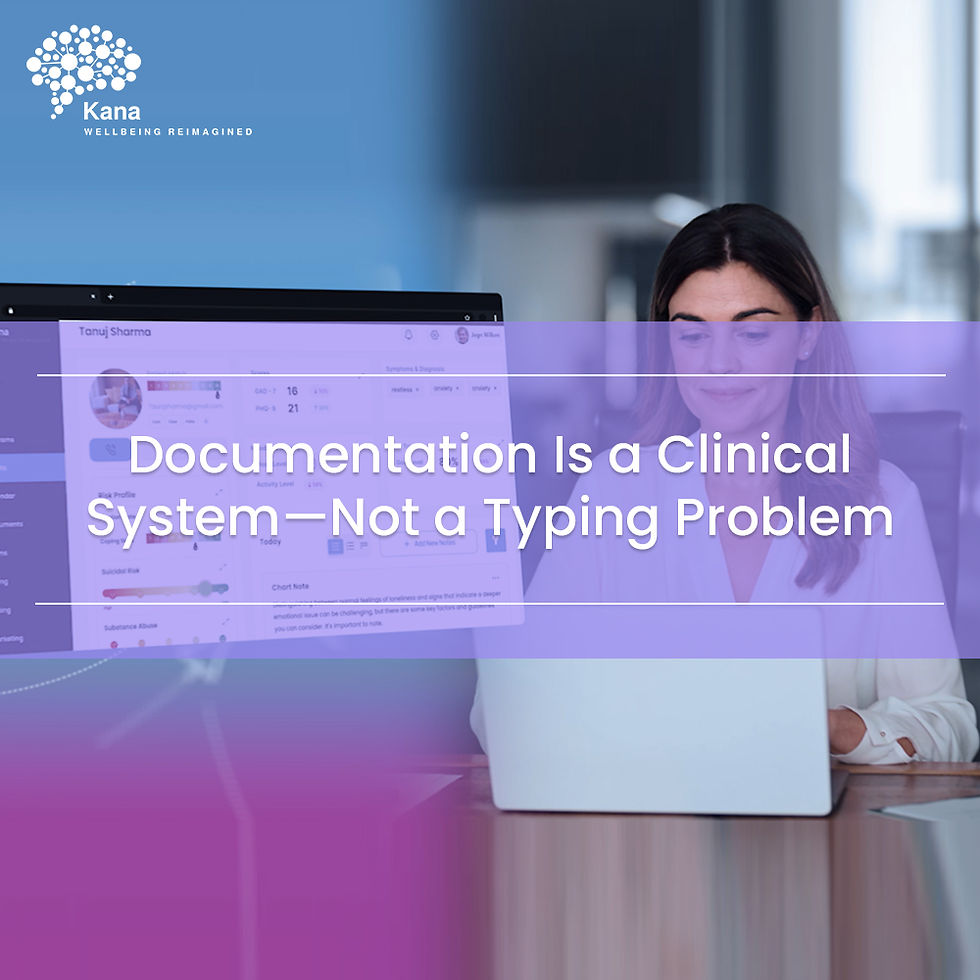Building Trust in AI for Mental Health: Ethics, Privacy, and Human-Centred Design
- emailvishesh
- Feb 16, 2025
- 3 min read
As artificial intelligence (AI) becomes increasingly integrated into mental health care, concerns surrounding its ethical use, data privacy, and human-centred design have emerged as critical considerations. Trust is paramount in any healthcare interaction, and when AI is involved, it becomes even more essential to address potential fears and challenges.

This article explores how AI can gain trust in mental health care while spotlighting Kana Health's commitment to ethical AI use, data security, and prioritizing the human experience.
Understanding the Concerns around AI in Mental Health
1. Data Privacy and SecurityMental health data is highly sensitive. Patients share personal, often deeply emotional information that requires stringent measures to ensure it is securely stored and managed.
Concern: Data breaches or misuse of personal health information could erode trust in AI systems.
Fact: According to a report by the World Economic Forum, the healthcare sector experienced the second-highest number of data breaches globally in 2022.
2. Bias and FairnessAI algorithms are only as good as the data they are trained on. Bias in datasets can lead to inequitable care, particularly for marginalized groups.
Concern: If AI models are not trained on diverse datasets, they may perpetuate or amplify existing health disparities.
Fact: A study published in Nature Medicine revealed that many AI healthcare tools exhibit biases against racial and ethnic minorities due to limited representation in training datasets.
3. Transparency and ExplainabilityPatients and clinicians need to understand how AI reaches its conclusions. A "black-box" approach to AI decision-making can undermine confidence.
Concern: Lack of explainability makes it difficult for clinicians to validate AI-generated recommendations.
Fact: The European Union's General Data Protection Regulation (GDPR) emphasizes the "right to explanation" for automated decisions, reflecting global demand for transparent AI systems.
Kana Health’s Commitment to Ethical AI and Trust-Building
Kana Health recognizes the critical role of trust in mental health care and has implemented robust measures to address concerns surrounding ethics, privacy, and user experience.
1. Ethical AI Use
Kana ensures that its AI systems are developed and deployed with the highest ethical standards.
Diversity in Data Training: Kana trains its AI models on diverse datasets to minimize biases and ensure equitable care across demographics.
Clinical Oversight: AI is designed to augment, not replace, human decision-making. Clinicians remain at the forefront of care delivery, using AI as a supportive tool.
2. Data Privacy and Security
Kana prioritizes the protection of patient data through advanced security measures.
Encryption and Anonymization: All patient data is encrypted, and personally identifiable information is anonymized to prevent unauthorized access.
Compliance with Global Standards: Kana adheres to stringent data protection regulations, including GDPR, HIPAA, and other local privacy laws.
3. Human-centred Design
Kana’s solutions are built around the needs of both therapists and patients, ensuring usability and accessibility.
User-Friendly Interfaces: Kana's tools are designed with intuitive interfaces that make it easy for therapists to navigate and utilize AI-driven insights.
Real-Time Insights: Clinicians receive actionable, data-backed recommendations without being overwhelmed by complexity.
How Kana Health Addresses Key Concerns
Bias Mitigation
Kana employs regular audits and updates to ensure AI models remain unbiased.
Collaborations with diverse clinical researchers help refine algorithms for inclusivity.
Transparency
Kana provides clinicians with detailed explanations for AI-generated recommendations, enabling informed decision-making.
Patients are informed about how their data is used and how AI assists in their care.
3. Building Trust Through Collaboration
Kana actively involves clinicians in the AI development process, incorporating feedback to refine its tools.
Continuous training sessions help therapists understand AI capabilities and limitations, fostering confidence in its use.
The Potential of AI in Mental Health Care
Kana Health exemplifies the potential of AI to enhance mental health care while addressing ethical and privacy concerns. By committing to human-centered design and rigorous data security measures, Kana is setting a benchmark for trustworthy AI in healthcare.
As AI adoption in mental health continues to grow, the focus must remain on ethical implementation, fostering transparency, and protecting patient data. Platforms like Kana Health demonstrate how AI can empower clinicians, improve patient outcomes, and maintain the trust that is foundational to effective mental health care.
References:
World Economic Forum, 2022, “The Future of Privacy in Healthcare.”
Nature Medicine, 2021, “Bias in AI Healthcare Tools: The Need for Inclusive Data.”
General Data Protection Regulation (GDPR), 2018, "Right to Explanation and Transparency."
American Psychological Association, 2023, “Trust in AI: Bridging the Gap in Mental Health Care.”















Comments